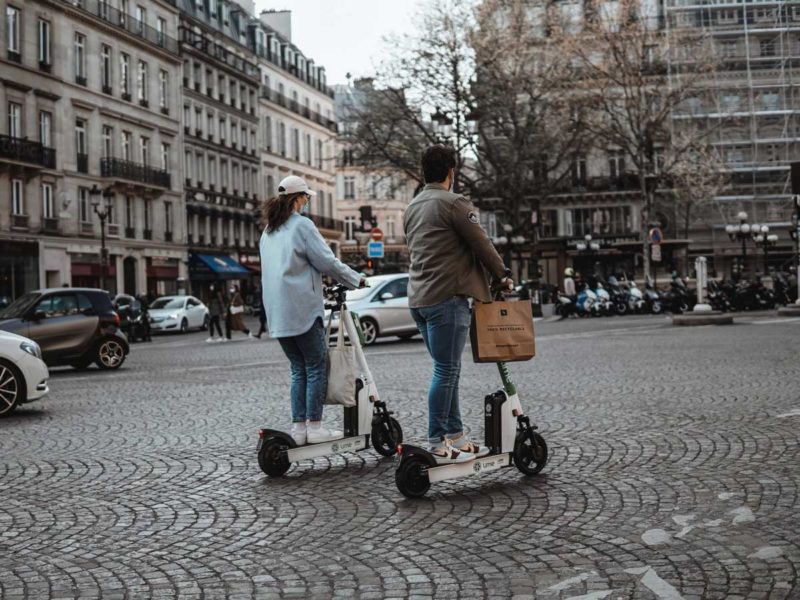There is always a lot to plan and think about when you’re traveling. When it comes to being a sustainable traveler however, even the most basic things can feel more complicated. You may have booked your sustainable accommodation, green tour, and found eco friendly transport but what about grocery shopping?! In this article we’ll uncover the top sustainable grocery shopping tips for traveling.
As sustainable travelers it can be easy to forget about food. When you’re in a new country, soaking up all the sights, hearing a new language, navigating a new city, the last thing you may want to think about is grocery shopping. If you’re trying to be more sustainable, then how you grocery shop and eat has to be prioritized.
The good news is that sustainable grocery shopping abroad is not only easier than you think, but it has more benefits than just being eco-friendly. Shopping sustainably is often more cost effective, it’s a great way to discover new parts of town and local brands, and it’s the easiest way to taste the local cuisine.
Below you’ll find 14 different sustainable grocery shopping tips that are not only fun, but easy for travelers and locals alike.
14 Easy Grocery Shopping Tips For Sustainable Travelers

Research The Local Food Production and Cuisine Before You Shop
First off, it’s important to know what you’re shopping for before you start shopping. Each place in the world offers its own local cuisine, food and production methods. In order to ensure you’re shopping sustainably, a little research goes a long way. Look up what foods are indigenous to the area, and then look up what the typical food production is like there.
Do most food items come from local farms or are the majority of items found in chain superstores and shipped from all over the world? Is there something that you should avoid in your location due to unethical or hazardous production methods? Do you need to sanitize your vegetables or drinking water? What’s grown locally?
Once you know what is produced locally, and how, you can know what items are the most sustainable to prioritize when you go grocery shopping. You can also get a good idea of what types of items are popular and plentiful so you can start planning your grocery list and meals ahead of time.
Search for Grocery Stores In the Local Language
One of my favorite grocery shopping tips is to search for stores in the local language. I cannot tell you how many markets, especially small, sustainable ones, did not come up on Google Maps when I searched in English. When I searched in the local language however, I found the best options.
If you’re not finding what you’re looking for, you may just be a quick Google translate away from finding the perfect sustainable grocery store.
Utilize Travel Groups or Ask Locals
Another great way to find sustainable and local markets, grocery stores and businesses is to ask around. A lot of the more sustainable options found internationally are smaller businesses that may or may not have a strong online presence.
An easy solution to that is to join local community groups, like Facebook Expat groups. I’ve been given the best local grocery shopping tips via Facebook Groups, as well as connected with locals. Many people even make home goods that they sell through word of mouth and this is a fantastic, truly sustainable way to grocery shop and support the local economy.
If you don’t have Facebook, or aren’t interested in checking out local groups, simply ask around! If you don’t have any local friends, chances are there’s someone local you know, be it from your accommodation, a tour guide or someone you meet while exploring.

Always Have Cash on You
If you’re going to prioritize any of these grocery shopping tips, you should start with this one. When you’re shopping at local markets or foreign grocery stores, cash is key.
Most markets don’t take credit cards and even if they do, it’s better to pay in cash if you can so they can get the full amount.
Choose Local Markets
If you’re trying to do sustainable grocery shopping while traveling, the best and first place you should start is the local markets. These markets are hands down the best way to support the local economy and farmers directly. You can typically find them easily listed on your map. Local markets also give you some of the best food, most local produce, and best prices.
While shopping at the local market is sustainable in itself, you can even go a step further by looking for natural or organic farmers’ markets in the areas. A great resource is Slow Food which has farmers markets throughout the world, in almost every mid to major city.
Prioritize Organic, Natural, Artisan or Health Food Stores
After you’ve found your produce and local meats at the markets, it’s time to check out the local sustainable grocery stores. Here is where you’ll find more specific items and pantry staples, as well as eco-friendly beauty and household products.
A great way to find these stores is to search for either organic, natural, artisan or health food stores. Any of these keywords should help you find great sustainable, local grocery stores in your area.
While going to eco-friendly grocery stores may not be as convenient or well stocked as shopping at the local superstore, they will offer much more sustainable, local items to choose from.

Seek Out Low or Zero Waste Grocery Stores
If you’re grocery shopping on a budget while prioritizing sustainable shopping, then this is one of the best grocery shopping tips for you. It took me far too long to realize the magic that is zero waste grocery stores while traveling.
First of all, these stores are plastic free and filled with only local items. Second of all, everything is usually bulk, so you can buy only what you need during your stay which limits your food waste. Finally, they are super cost effective.
Zero-waste stores also provide the perfect opportunity to refill any recently finished items, or reuse any leftover jars, tupperware or packaging you have lying around.
Bring Your Reusable Grocery Bag
This is one of the most essential grocery shopping tips, even if you’re just shopping at conventional stores. I quickly realized once I left the US that almost every other country I went to didn’t provide plastic bags. While I was incredibly excited at how sustainable this was, I also realized how essential packing reusable grocery bags were.
Always bring a reusable grocery bag with you as most stores won’t provide one, and some don’t even have reusable ones for sale. If you want to shop while traveling and are unsure of where to pack, you can bring the Lotus Sustainable trolley bags and produce bags. The Lotus Sustainable’s trolley bags provides the safest and greenest way to shop. Made from BPA-Free eco-friendly materials, these bags fit in ordinary shopping carts to help you keep organized.
Besides, they are multi-purpose to fit a variety of items such as vegetables, fruits, small to medium household items, snacks, toys, and more.
Use our code HIDDENLEMUR10 and receive a 10% discount.
Normalize Shopping Around
Unless the city you’re in has top-notch sustainable supermarkets, chances are you won’t find everything in one place and that’s more than okay. When shopping sustainably, just about anywhere, the focus should be on local and fresh items. This in itself requires shopping at numerous locations as many shops or markets may only carry certain specialty or homemade items.
Yes, shopping around may seem like more of an effort but it’s something we should all normalize on our sustainable journey. It’s a great way to see different parts of town, support different businesses and discover local products and brands. I make sustainable shopping a part of my sightseeing and it makes everything more exciting.

Skip Plastic Items and Bags
Aim to purchase only items with minimal to no packaging. Avoid bagging your fruits and veggies unless you carry reusable produce bags with you. Little changes like these go a long way when it comes to our environmental impact.
When you’re shopping at sustainable grocery stores or markets, this typically isn’t very difficult to do since markets use little to no packaging and zero-waste stores use none. But if you don’t have any local options, or you have to shop at conventional grocery stores, be mindful of the packaging in order to be as sustainable as possible.
Lotus Sustainable’s produce bags provide sustainable alternatives to plastic bags. If you are keen on eliminating the use of plastic while shopping, these reusable produce bags come in handy. You can package all your grocery shopping in these washable, multi-purpose eco-friendly shopping bags and get going.
Use our code HIDDENLEMUR10 and receive a 10% discount.
Embrace Bulk Goods
I mentioned this above, but it’s one of my favorite sustainable grocery shopping tips. Bulk goods are crucial for sustainable travelers. When you’re traveling, chances are you’ll only be in a location for a short amount of time yet most pantry staples only come in one size.
Prioritizing the bulk section or bulk stores can eliminate your food waste. Now, whenever I need pantry items like nuts, cooking oil, grains, beans, etc, I always choose bulk if it’s available. Plus, you’ll end up with a little extra spending money since it’s a more cost-effective option.
Choose Seasonal + Local Foods
One of the best things about traveling is eating local food. This can also be a great thing to consider when you’re trying to figure out how to sustainably grocery shop. An easy way to do this is to prioritize seasonal, local foods. Eating seasonally is often the only option in certain countries that don’t have access to every type of produce year round, which makes eating seasonally even easier for the sustainable traveler.
Choosing local items at the grocery store is an essential for sustainable travelers. When you buy local, you’re supporting the local economy and there’s less travel time since the items are grown and packaged right there versus being shipped and transported from different parts of the world.

When Possible, Always Buy Local Brands over International Brands
You may notice that your favorite almond milk, peanut butter or chips are available in different countries throughout the world. You may also notice that the cost is very different – it’s probably much higher than it is back at home.
Supporting local brands over international ones is one of those sustainable grocery shopping tips that provides numerous benefits. Like many of the tips above, it’s much more cost effective. It also introduces you to great new brands you otherwise might not have heard of. This gives you the chance to support them while you’re in their country instead of the same old brands from back home that probably don’t need your support.
Plus, just like above, if the items are produced within the same country you’re buying them in, this has a much lower carbon footprint than international shipping and production.
Buy Only What You Need
When grocery shopping abroad, it’s important not to go overboard. I learned very quickly that when I shopped for food while traveling like I did back home, I ended up with way more food waste. When we’re traveling, we tend to eat out more often, and cook less. I’ve also noticed that many countries use less preservatives than my home country, so my produce went bad a lot quicker than I was used to.
It’s important to do a little bit of prep before you hit the stores in order to keep your shopping truly sustainable and limit your food waste. Try to consider the week ahead, the number of meals you realistically will cook and how many things you need to make these meals without having your food go to waste.
Go Plant Based When Possible
Last but not least, it’s a great sustainable idea to try to go plant based when you can. If you can’t figure out where the meat comes from, don’t buy it. If you’re worried about getting food poisoning in a specific country, a great way to lessen your chances is to not eat meat.
Plus, plant based groceries are typically more cost effective and longer lasting than animal based products.
These are just a few reasons why as a sustainable traveler it can be worthwhile to prioritize a plant based lifestyle when grocery shopping abroad.
- Disclaimer: Hey reader! Some of the links in this post are affiliate links. This means that if you make a purchase using any of these links, we’ll earn a small commission at no extra cost to you. Hidden Lemur is committed to promoting sustainable travel, and we only partner with brands that we believe contribute positively to that cause.







































